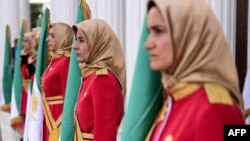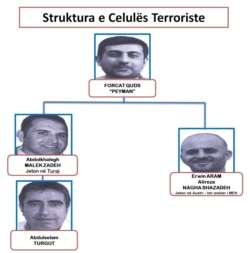Albania has identified members of an alleged Iranian terrorist cell that it says has been plotting to attack followers of an exiled Iranian opposition group based in the country.
In a press briefing attended by VOA Albanian in Tirana on Wednesday, Albanian Police Chief Ardi Veliu displayed photos of three Iranian men and one Turkish man suspected of involvement in the cell that he said was targeting the People's Mujahedeen of Iran group, also known as MEK. About 2,500 members of MEK, which advocates the overthrow of "religious dictatorship" in Iran, have relocated from Iraq to a compound in western Albania since 2014.
Veliu said the alleged cell leader's family name is Peyman and described him as an Iran-based operative of the Quds Force, the overseas wing of Iran's Islamic Revolutionary Guard Corps. He said Peyman had sent another Iranian cell member, Alireza Nagha-Shazadeh, identified as a former MEK member with an Austrian passport, to Albania several times to gather information for a planned attack on the group.
Third Iranian based in Turkey
The Albanian police chief named the third Iranian suspect as Abdolkhalegh Malek-Zadeh, who he said was based in Turkey and had been working for the past two years with a Turkish man named Abdulselam Turgut to plan terrorist attacks at the behest of Peyman and the Quds Force. The police chief also accused both Malek-Zadeh and Turgut of having links to organized crime.
Albanian authorities jailed Turgut in 2011 on charges related to the alleged trafficking of about one ton of heroin. He fled Albania using a false passport after a court released him to house arrest.
Veliu said the four suspects had plotted to attack high-level MEK members attending Persian New Year festivities in March 2018 but were prevented from doing so by Albanian police action.
In a Wednesday tweet, Albanian Deputy Interior Minister Romina Kuko thanked her government's security agencies for having "successfully foiled" an attack by the alleged cell on MEK members in the country. It was not clear whether she was referring to the March 2018 plot or another one.
Albanian officials did not say what other attacks the alleged terrorist cell had been plotting or whether any arrest warrants had been issued for its members.
There was no immediate comment on the identification of the suspects from the Iranian or Turkish governments.
Albania expelled two Iranian diplomats, including Tehran's ambassador in Tirana, last December on suspicion of involvement in activities that threatened Albanian security.
MEK leader Maryam Rajavi, who also heads the France-based National Council of Resistance of Iran (NCRI), responded on Twitter to Albania's identification of the alleged cell by reiterating her call for Iran's embassies to be closed and for the IRGC to be designated as a terrorist organization.
The Trump administration designated the IRGC as a foreign terrorist organization in April, the first time the United States had applied such a designation to an agency of a foreign government.
In January, the European Union imposed sanctions on a unit of Iran's intelligence services and two individuals after accusing them of plotting to assassinate Iranian opposition activists in the Netherlands, Denmark and France. Iran denied engaging in any such plots.
MEK and terrorism
MEK also has faced accusations of involvement in terrorism. It carried out bombings against the Iranian shah's government in the 1970s and later against Iran's post-revolution Islamist rulers in the 1980s and 1990s. The United States designated MEK as a terrorist organization in 1997, citing those attacks, including 1970s-era bombings that killed several U.S. defense contractors.
The U.S. removed its terrorist label from MEK in 2012, crediting the group's public renunciation of violence, the lack of any confirmed militant attacks by the group in more than a decade, and its cooperation in the closure of its paramilitary base in Iraq, from where its members relocated to Albania.
MEK had spent years lobbying and securing the support of prominent American politicians to press for the removal of the terrorism designation.
This article originated in VOA's Persian service. Michael Lipin contributed from Washington.






